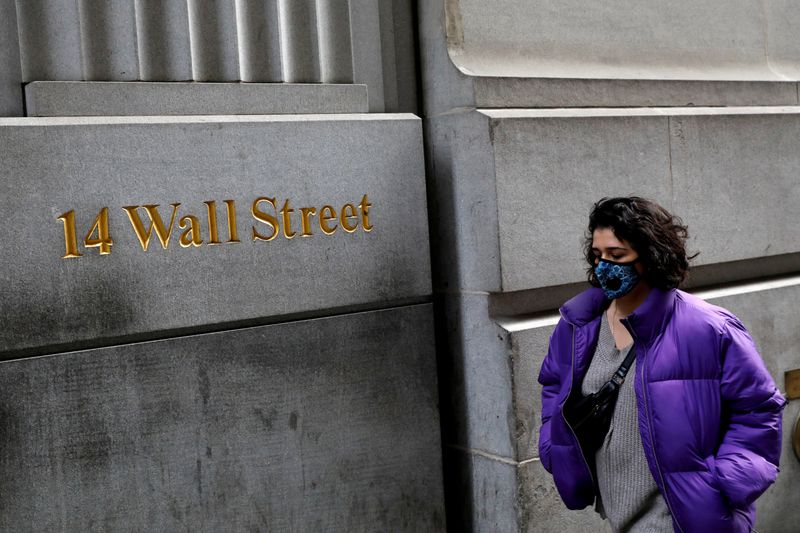Gold prices edge lower; heading for weekly losses ahead of U.S.-Russia talks
By Geoffrey Smith
Investing.com -- The global rally in stocks fizzles, jobless claims and U.S. CPI data are due, and the heads of the Federal Reserve, European Central Bank and Bank of England all chime in on the outlook for monetary policy. Disney reports after the close - and oil weakens after another downgrade to global demand forecasts. Here's what you need to know in financial markets on Thursday, November 12th.
1. Global stock rally fizzles
The global rally in stocks on the back of Pfizer’s vaccine news ground to a halt, as markets took on board the near-term challenges of a still-potent coronavirus.
European stock markets were already falling, even before the release of a surprise drop of 0.4% in Eurozone industrial production in October that underlined the impact of the second wave of Covid-19. The number was a surprise not least because no country has gone so far as to shut its factories again. Industrial bellwether Siemens stood out with a gloomy outlook for the year.
Markets were also unsettled by rising case numbers across New York state, a day after New Jersey tightened its restrictions on non-essential businesses. However, New York City mayor Bill de Blasio said it wasn’t yet time to impose any sort of fresh lockdown on the city.
The mood wasn’t helped by the optics of Pfizer (NYSE:PFE) CEO Albert Bourla selling most of his Pfizer stock so swiftly in the wake of Monday’s announcement. While the sale was pre-programmed, it raised suspicions that the vaccine may not be all that the market had hoped on Monday.
2. Jobless claims, CPI due
The U.S. economy gets its weekly reality check from the labor market with initial and continuing jobless claims at 8:30 AM ET (1330 GMT).
Initial claims are expected to have fallen only marginally to 735,000 from 751,000 a week earlier, while another 385,000 drop in continuing claims is expected. The figures will be the first since October’s surprisingly strong nonfarm payrolls growth was published.
Also at 8:30 AM ET there will be consumer price inflation data for October, where the annual rate is expected to tick up to 1.8% from 1.7% in September. The figure likely understates the actual rate, given that the pandemic has shifted consumption more toward high-frequency items like food, where prices are rising faster.
3. U.S. stocks set to open mixed; tech rotates back into favor
U.S. stock markets are indicated to open mostly lower, with the rotation trade into cyclicals and value stocks going continuing to correct.
By 6:30 AM ET (1130 GMT), Dow Jones futures were down 125 points, or 0.4%, while S&P 500 futures were down 0.1%, while Nasdaq futures, which had already outperformed on Wednesday, doing so again with a 0.3% rise.
Analysts suggest that the shift into beaten-down value stocks had gone too far initially, while underlying demand for the insurance offered by growth stocks remains healthy.
Walt Disney (NYSE:DIS) and Cisco Systems (NASDAQ:CSCO) lead a dwindling bunch of quarterly updates, both of them after the closing bell.
4. Powell, Lagarde and Bailey to talk about the policy outlook
Federal Reserve Chairman Jerome Powell, ECB President Christine Lagarde and Bank of England Governor Andrew Bailey will all address a virtual forum on central banking at 11:45 AM ET.
Powell’s appearance will be the first since Joe Biden was declared President-elect last weekend, which may allow him to be less guarded about the policy outlook than he was at his press conference last week.
Lagarde, meanwhile, had told the same event on Wednesday that the ECB is likely to focus on its cheap long-term loan offerings and on its 1.35 trillion pandemic-related bond-buying program when its governing council meets again in December. Her failure to play up the ECB’s discount rate suggested to analysts that the ECB will leave its official interest rates unchanged, however.
Bailey’s comments will again be scanned for hints about whether the Bank of England will experiment with negative interest rates, something the market is still betting on.
5. Oil steady as IEA downgrades forecast; U.S. inventory data due
The International Energy Agency followed OPEC in revising down its forecasts for global oil demand this year, in the face of a resurgence of Covid-19 across the northern hemisphere.
The thinktank also predicted a more modest rebound in 2021 than it had previously expected, saying that the effects of any vaccine against the coronavirus are only likely to be felt in the oil market from the second half of the year.
It also noted that global oil stockpiles remain historically high. The U.S. government will update its weekly stockpile data at 11.00 AM ET, a day later than usual due to the Veterans Day holiday.
